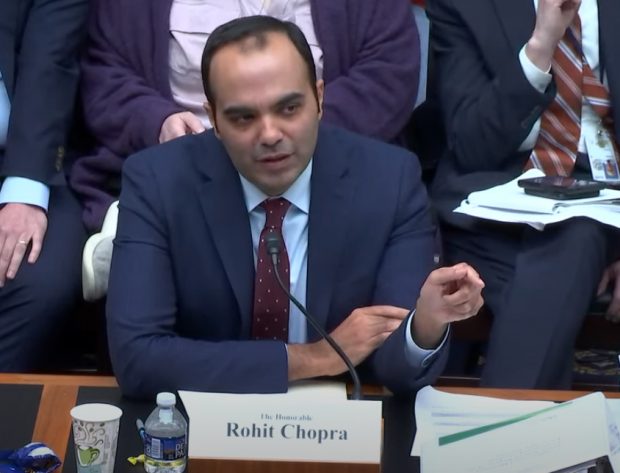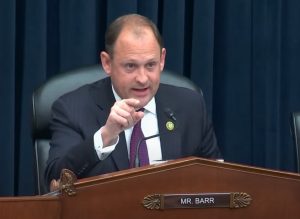 CFPB Director Rohit Chopra testifying Wednesday before the House Financial Services Committee.
CFPB Director Rohit Chopra testifying Wednesday before the House Financial Services Committee.
The director of the Consumer Financial Protection Bureau was praised by Democrats and criticized by Republicans during his appearance before the House Financial Services Committee Wednesday.
Republicans raised many of the criticisms made by CUNA and NAFCU, most recently in a letter the groups sent to the committee Tuesday.
Recommended For You
In the nine-page letter, President/CEO Jim Nussle of CUNA and President/CEO Dan Berger of NAFCU raised objections to CFPB rules to allow consumers to get and share their financial data with other providers and to require large credit unions to collect data on business loans. They also objected to the way the CFPB has characterized "junk fees."
"Congress created the CFPB specifically to address the irresponsible lending and banking practices of large too-big-to-fail banks and unregulated sectors of the consumer financial services marketplace," Nussle and Berger wrote.
"These entities are where the Bureau should dedicate most of its time and resources," they wrote. "If the Bureau spent fewer resources on regulating and supervising credit unions and other small lenders subject to federal prudential regulation, then it will have more available to focus on the businesses actively engaged in objectionable practices that exploit consumers.
"We believe this balance can be accomplished without sacrificing important consumer protections."
The letter repeated the groups' position that the CFPB's single director needs to be replaced by a "bipartisan commission," but it avoided mention of their support of stripping the CFPB of its independent funding structure, a move that consumer groups have said would make the agency toothless.
The funding issue is at the heart of a decision expected next spring from the U.S. Supreme Court.
CUNA and NAFCU filed a brief in July supporting the suit brought by payday lenders that said CFPB rules are invalid because the agency's funding violates the Constitution's Appropriations Clause.
Congress created the CFPB though the Dodd-Frank Wall Street Reform and Consumer Protection Act of 2010 in the wake of the Great Recession. Congress ordered that the CFPB be funded by a capped amount of the Federal Reserve System's annual funds in a way that gave the Fed no control over its disbursement. In fiscal year 2022, the CFPB received $641.5 million of the $734 million allowed by the cap.
At a few points in Wednesday's hearing, House members brought up the pending decision by the U.S. Supreme Court.
Chopra addressed the issue in passing, saying the agency has been careful with its spending and has not requested the full amounts Congress allowed it to collect each year from the Federal Reserve.
"But of course we await the Supreme Court's ruling [for] the CFPB," he said. "The Fed, the OCC the FDIC and others are funded very similarly, so we're all looking forward to getting a conclusion to that issue."
Rep. Brad Sherman (D-Calif.), said he was "pretty confident" the Supreme Court would uphold the CFPB's current independent structure. "It's so necessary to continuing the work you've been doing."
The House Financial Services Committee held the hearing to allow members to question Chopra on the CFPB's semi-annual report to Congress, which the CFPB is required to make under the Dodd-Frank Act.
Before Chopra spoke, Rep. Andy Barr (R-Ky.), called the CFPB "the most unaccountable agency in the entire federal bureaucracy."
"The agency has acted unilaterally and arbitrarily outside in the statutory mandate, and we've seen time and time again the Bureau under you and your predecessors pursue lawless regulations," Barr said.
 Rep. Andy Barr (R-Ky.), questioning CFPB Director Rohit Chopra at a House Financial Services Committee hearing Wednesday.
Rep. Andy Barr (R-Ky.), questioning CFPB Director Rohit Chopra at a House Financial Services Committee hearing Wednesday. "We just need to fund the agency the right way, the constitutional way, and that is through the power of the purse so that the agency becomes a professional non-partisan regulator, not a partisan regulator that acts outside of the law," he said.
As questioning alternated by party, Republicans criticized the agency and Democrats praised it.
Rep. Bill Foster (D-Ill.), said the CFPB has collected more than $4 billion in penalties for violations of the law and collected and distributed to consumers more than $20 billion in relief. He said more than 82% of Americans and 77% of Republicans support the mission of the CFPB.
"Since we passed the Dodd-Frank Act that created the CFPB back in 2010, the CFPB has effectively fulfilled its mission to protect consumers from unfair, deceptive and abusive practices in financial markets despite coming under continual attack," Foster said.
Chopra said the $20 billion in relief collected from companies has been distributed to millions of consumers.
"There's no way people would have been able to get all this on their own. In some ways they would not have known about the errors or mischarge.
"We should want a marketplace where members play by the rules," he said. "We try to help firms that do, but where they don't we have to take action."
In his opening remarks, Chopra said the CFPB was "sharpening its focus on the evolving patterns of household debt," noting consumer debt has accelerated in many areas. He included a reference the CFPB has made several times in recent months that credit card debt surpassed $1 trillion for the first time in 2022.
The Federal Reserve's G-19 Consumer Credit Report, which has monthly data on credit card debt going back to January 1968, showed the $1 trillion mark was first passed in December 2017, then again from August 2018 through March 2020. It fell below $1 trillion with the onset of the pandemic, finally surpassing the mark again in November 2021 and remaining above it since.
© 2025 ALM Global, LLC, All Rights Reserved. Request academic re-use from www.copyright.com. All other uses, submit a request to [email protected]. For more information visit Asset & Logo Licensing.






